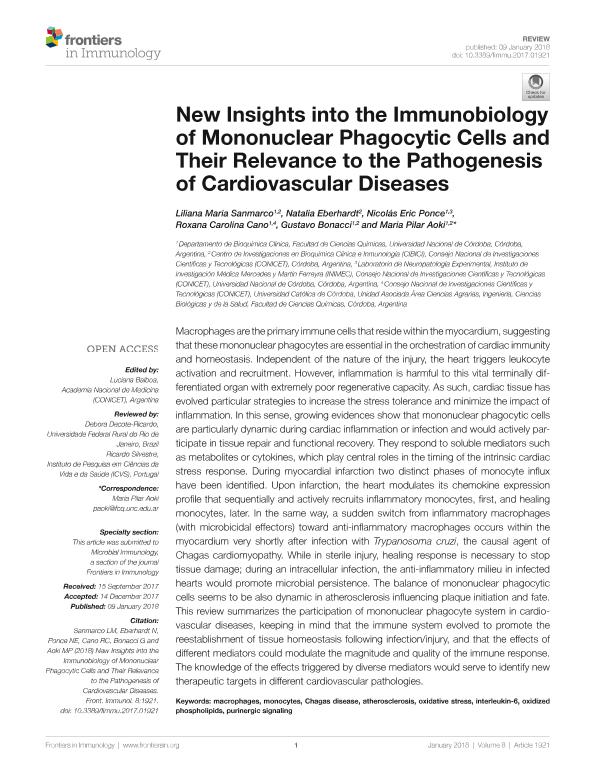Artículo
New insights into the immunobiology of mononuclear phagocytic cells and their relevance to the pathogenesis of cardiovascular diseases
Sanmarco, Liliana Maria ; Eberhardt, Natalia
; Eberhardt, Natalia ; Ponce, Nicolás Eric
; Ponce, Nicolás Eric ; Cano, Roxana Carolina; Bonacci, Gustavo Roberto
; Cano, Roxana Carolina; Bonacci, Gustavo Roberto ; Aoki, Maria del Pilar
; Aoki, Maria del Pilar
 ; Eberhardt, Natalia
; Eberhardt, Natalia ; Ponce, Nicolás Eric
; Ponce, Nicolás Eric ; Cano, Roxana Carolina; Bonacci, Gustavo Roberto
; Cano, Roxana Carolina; Bonacci, Gustavo Roberto ; Aoki, Maria del Pilar
; Aoki, Maria del Pilar
Fecha de publicación:
01/2018
Editorial:
Frontiers Media S.A.
Revista:
Frontiers in Immunology
e-ISSN:
1664-3224
Idioma:
Inglés
Tipo de recurso:
Artículo publicado
Clasificación temática:
Resumen
Macrophages are the primary immune cells that reside within the myocardium, suggesting that these mononuclear phagocytes are essential in the orchestration of cardiac immunity and homeostasis. Independent of the nature of the injury, the heart triggers leukocyte activation and recruitment. However, inflammation is harmful to this vital terminally differentiated organ with extremely poor regenerative capacity. As such, cardiac tissue has evolved particular strategies to increase the stress tolerance and minimize the impact of inflammation. In this sense, growing evidences show that mononuclear phagocytic cells are particularly dynamic during cardiac inflammation or infection and would actively participate in tissue repair and functional recovery. They respond to soluble mediators such as metabolites or cytokines, which play central roles in the timing of the intrinsic cardiac stress response. During myocardial infarction two distinct phases of monocyte influx have been identified. Upon infarction, the heart modulates its chemokine expression profile that sequentially and actively recruits inflammatory monocytes, first, and healing monocytes, later. In the same way, a sudden switch from inflammatory macrophages (with microbicidal effectors) toward anti-inflammatory macrophages occurs within the myocardium very shortly after infection with Trypanosoma cruzi, the causal agent of Chagas cardiomyopathy. While in sterile injury, healing response is necessary to stop tissue damage; during an intracellular infection, the anti-inflammatory milieu in infected hearts would promote microbial persistence. The balance of mononuclear phagocytic cells seems to be also dynamic in atherosclerosis influencing plaque initiation and fate. This review summarizes the participation of mononuclear phagocyte system in cardiovascular diseases, keeping in mind that the immune system evolved to promote the reestablishment of tissue homeostasis following infection/injury, and that the effects of different mediators could modulate the magnitude and quality of the immune response. The knowledge of the effects triggered by diverse mediators would serve to identify new therapeutic targets in different cardiovascular pathologies.
Archivos asociados
Licencia
Identificadores
Colecciones
Articulos(CIBICI)
Articulos de CENTRO DE INV.EN BIOQUI.CLINICA E INMUNOLOGIA
Articulos de CENTRO DE INV.EN BIOQUI.CLINICA E INMUNOLOGIA
Articulos(IFIBIO HOUSSAY)
Articulos de INSTITUTO DE FISIOLOGIA Y BIOFISICA BERNARDO HOUSSAY
Articulos de INSTITUTO DE FISIOLOGIA Y BIOFISICA BERNARDO HOUSSAY
Citación
Sanmarco, Liliana Maria; Eberhardt, Natalia; Ponce, Nicolás Eric; Cano, Roxana Carolina; Bonacci, Gustavo Roberto; et al.; New insights into the immunobiology of mononuclear phagocytic cells and their relevance to the pathogenesis of cardiovascular diseases; Frontiers Media S.A.; Frontiers in Immunology; 8; 1-2018
Compartir
Altmétricas



